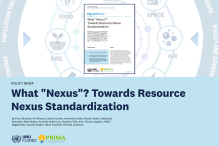Based on research and analysis undertaken as part of the Migration for Development and Equality (MIDEQ) Hub, this UNU-CPR discussion paper challenges the dominant policy and practice narratives in relation to children whose parents have migrated without them, and specifically, the framing of these children as “left behind.”
The authors’ concern with the use of this term is that it implies that children are abandoned, especially in the context of mothers migrating, and that they are passively living with the migration process and its consequences. They argue instead that migration in the Global South is part of a household livelihood strategy which children can participate in and understand – and from which they often benefit.
Drawing on case studies highlighting the varied experiences of children whose parents have migrated without them from four very different migration contexts in the Global South – Burkina Faso, Egypt, Ethiopia, and Nepal – this paper argues for, and uses, the term “stay back” to describe children in migration households who do not move with their parents or primary, traditional, or customary carers. This term, it is argued, better encapsulates these children’s realities.
The paper concludes with reflections on what this rethinking of the concept of left behind children might mean for policy interventions intended to reduce childhood-related inequalities in contexts of migration.
Access ‘From Left Behind to Staying Back: Changing How We Think About Children in Migrant Households’ here.
Suggested citation: Heaven Crawley, Mackenzie Seaman, Anita Ghimire, Rawan Rbihat, Gabriel Sangli and Meron Zeleke. From Left Behind to Staying Back: Changing How We Think About Children in Migrant Households : UNU-CPR, 2023.

